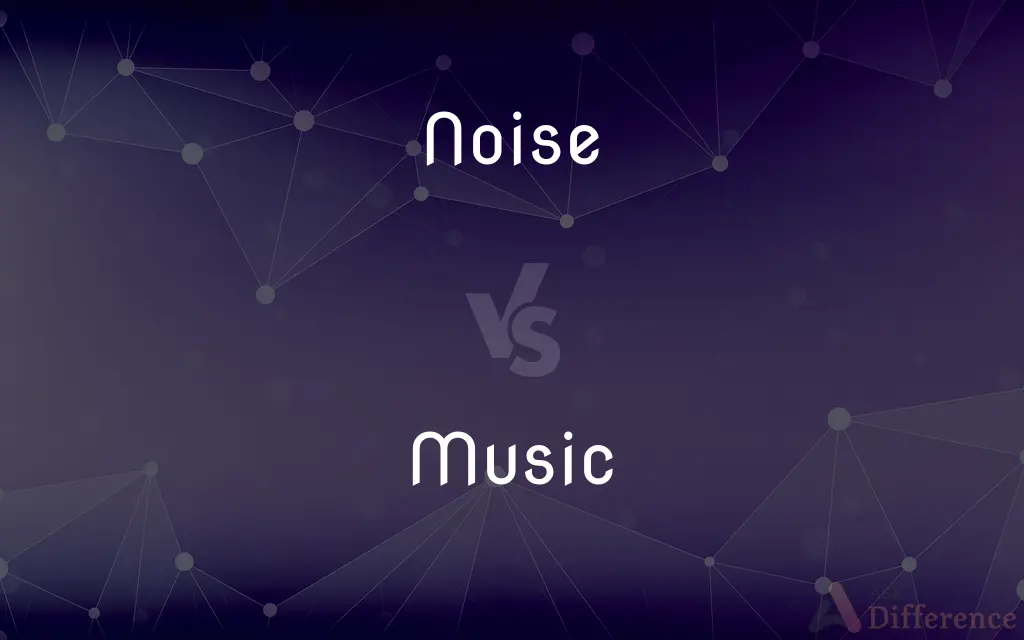Noise vs. Music — What's the Difference?
By Tayyaba Rehman & Fiza Rafique — Updated on March 21, 2024
Noise is unwanted sound, often chaotic and without a clear pattern, while music is structured and intended to be harmonious and expressive.

Difference Between Noise and Music
Table of Contents
ADVERTISEMENT
Key Differences
Noise is generally considered as any unwanted sound that is unpleasant, loud, or disruptive to hearing. Unlike noise, music is an artistic form of auditory communication incorporating instrumental or vocal tones in a structured and continuous manner.
Noise often lacks a clear structure or pattern, making it random and unpredictable. On the other hand, music is characterized by rhythm, melody, harmony, and dynamics, making it pleasant and emotionally expressive.
While noise can cause stress, hinder concentration, and potentially damage hearing over prolonged exposure, music has the power to soothe, uplift, and even heal, influencing mood and emotional states positively.
Noise is typically associated with environmental or industrial sounds like traffic, construction, or machinery. Conversely, music encompasses a wide range of genres, each with distinct styles, instruments, and cultural backgrounds, reflecting human creativity and diversity.
In some contexts, the distinction between noise and music can be subjective, as what may be considered noise to one person could be music to another, depending on individual taste, cultural background, and context.
ADVERTISEMENT
Comparison Chart
Definition
Unwanted sound, often disordered.
Structured sound, intended to be harmonious.
Structure
Lacks clear structure or pattern.
Has rhythm, melody, harmony, and dynamics.
Emotional Effect
Can cause stress or discomfort.
Can soothe, uplift, and express emotions.
Typical Sources
Traffic, construction, machinery.
Instruments, vocals, electronic synthesis.
Subjectivity
May be considered music by some.
Can be disliked and considered noise by some.
Compare with Definitions
Noise
Lacks Musical Structure.
The noise from the broken fan had no rhythm or harmony.
Music
Structured Sound.
Classical music is known for its complex structure and depth.
Noise
Unwanted Sound.
The construction outside produced noise that disrupted my focus.
Music
Subjectivity.
What one person considers beautiful music, another might find dissonant.
Noise
Environmental Origin.
Urban areas are often filled with noise from traffic and crowds.
Music
Cultural Diversity.
Music varies widely across cultures, each with its unique instruments and scales.
Noise
Negative Impact.
Prolonged exposure to loud noise can damage hearing.
Music
Positive Effects.
Listening to music can improve mood and reduce stress.
Noise
Subjectivity.
For some, the city's noise is an unwelcome disruption, while others find it energizing.
Music
Artistic Expression.
Her music beautifully conveys a range of emotions.
Noise
Noise is unwanted sound considered unpleasant, loud or disruptive to hearing. From a physics standpoint, noise is indistinguishable from desired sound, as both are vibrations through a medium, such as air or water.
Music
Music is the art of arranging sounds in time to produce a composition through the elements of melody, harmony, rhythm, and timbre. It is one of the universal cultural aspects of all human societies.
Noise
A sound, especially one that is loud or unpleasant or that causes disturbance
Making a noise like a pig
What's that rustling noise outside the door?
Music
The art of arranging sounds in time so as to produce a continuous, unified, and evocative composition, as through melody, harmony, rhythm, and timbre.
Noise
Irregular fluctuations that accompany a transmitted electrical signal but are not part of it and tend to obscure it
The enhancer can improve the video signal quality, reducing noise and increasing image sharpness
Music
Vocal or instrumental sounds possessing a degree of melody, harmony, or rhythm.
Noise
Talk about or make known publicly
You've discovered something that should not be noised about
Music
A musical composition.
Noise
Make much noise
Rook, crow and jackdaw—noising loud
Music
The written or printed score for such a composition.
Noise
Sound or a sound that is loud, unpleasant, unexpected, or undesired.
Music
Such scores considered as a group
We keep our music in a stack near the piano.
Noise
Sound or a sound of any kind
The only noise was the wind in the pines.
Music
A musical accompaniment.
Noise
A loud outcry or commotion
The noise of the mob.
A lot of noise over the new law.
Music
A particular category or kind of music.
Noise
(Physics) A disturbance, especially a random and persistent disturbance, that obscures or reduces the clarity of a signal.
Music
An aesthetically pleasing or harmonious sound or combination of sounds
The music of the wind in the pines.
Noise
(Computers) Irrelevant or meaningless data.
Music
A series of sounds organized in time, usually employing some combination of melody, harmony, tempo, rhythm etc. usually to convey a mood.
I keep listening to this music because it's a masterpiece.
Noise
A complaint or protest.
Music
(figuratively) Any pleasing or interesting sounds.
Noise
Rumor; talk.
Music
An art form, created by organizing of pitch, rhythm, and sounds made using musical instruments and sometimes singing.
Noise
Noises Remarks or actions intended to convey a specific impression or to attract attention
"The U.S. is making appropriately friendly noises to the new Socialist Government" (Flora Lewis).
Music
A guide to playing or singing a particular tune; sheet music.
Noise
To spread the rumor or report of.
Music
Electronic signal jamming.
Noise
(uncountable) Various sounds, usually unwanted or unpleasant.
He knew that it was trash day, when the garbage collectors made all the noise.
Music
Heated argument.
Noise
Any sound.
The sudden noise made everyone jump.
She crept up behind him not making a noise.
Music
Fun; amusement.
Noise
Sound or signal generated by random fluctuations.
Music
(transitive) To seduce or entice with music.
Noise
(technology) Any part of a signal or data that reduces the clarity, precision, or quality of the desired output.
Signal-to-noise ratio
Music
The science and the art of tones, or musical sounds, i. e., sounds of higher or lower pitch, begotten of uniform and synchronous vibrations, as of a string at various degrees of tension; the science of harmonical tones which treats of the principles of harmony, or the properties, dependences, and relations of tones to each other; the art of combining tones in a manner to please the ear.
Noise
Unwanted fuss or bustle; useless activity.
Music
Melody; a rhythmical and otherwise agreeable succession of tones.
Noise
(genetics) The measured level of variation in gene expression among cells, regardless of source, within a supposedly identical population.
Music
The written and printed notation of a musical composition; the score.
Noise
Rumour or complaint.
The problems with the new computer system are causing a lot of noise at Head Office.
Music
Love of music; capacity of enjoying music.
The man that hath no music in himselfNor is not moved with concord of sweet sounds,Is fit for treasons, stratagems, and spoils.
Noise
(informal) Speech that is suggestive of an attitude or opinion.
Music
A more or less musical sound made by many of the lower animals. See Stridulation.
Noise
(obsolete) Music, in general; a concert; also, a company of musicians; a band.
Music
An artistic form of auditory communication incorporating instrumental or vocal tones in a structured and continuous manner
Noise
(music) A genre of rock music that uses static and other non-musical sounds, also influenced by art rock.
Music
Any agreeable (pleasing and harmonious) sounds;
He fell asleep to the music of the wind chimes
Noise
(intransitive) To make a noise; to sound.
Music
Musical activity (singing or whistling etc.);
His music was his central interest
Noise
(transitive) To spread news of; to spread as rumor or gossip.
Music
(music) the sounds produced by singers or musical instruments (or reproductions of such sounds)
Noise
Sound of any kind.
The heavens turn about in a most rapid motion without noiseto us perceived.
Music
Punishment for one's actions;
You have to face the music
Take your medicine
Noise
Especially, loud, confused, or senseless sound; clamor; din.
Noise
Music, in general; a concert; also, a company of musicians; a band.
The king has his noise of gypsies.
Noise
To sound; to make a noise.
Noise
To spread by rumor or report.
All these sayings were noised abroad.
Noise
To disturb with noise.
Noise
Sound of any kind (especially unintelligible or dissonant sound);
He enjoyed the street noises
They heard indistinct noises of people talking
During the firework display that ended the gala the noise reached 98 decibels
Noise
The auditory experience of sound that lacks musical quality; sound that is a disagreeable auditory experience;
Modern music is just noise to me
Noise
Electrical or acoustic activity that can disturb communication
Noise
A loud outcry of protest or complaint;
The announcement of the election recount caused a lot of noise
Whatever it was he didn't like it and he was going to let them know by making as loud a noise as he could
Noise
Incomprehensibility resulting from irrelevant information or meaningless facts or remarks;
All the noise in his speech concealed the fact that he didn't have anything to say
Noise
The quality of lacking any predictable order or plan
Noise
Emit a noise
Common Curiosities
Can noise ever be considered music?
Yes, depending on personal taste and context, some may consider certain noises as music.
What are typical sources of noise?
Common noise sources include traffic, industrial activities, and construction.
Can music have a negative effect?
While generally positive, music at high volumes or certain genres may cause discomfort to some.
Is the distinction between noise and music subjective?
Yes, perceptions of what constitutes noise or music can vary greatly among individuals.
How is music different from noise?
Music is structured and designed to be harmonious and expressive, unlike noise.
What are the components of music?
Music consists of rhythm, melody, harmony, and dynamics.
How does music affect emotions?
Music can profoundly influence emotions, uplifting or soothing listeners.
What defines noise?
Noise is defined as any unwanted, unpleasant, or disruptive sound.
Why is noise often considered negative?
Noise can cause stress, disrupt concentration, and harm hearing health.
How do musicians structure their music?
Musicians use elements like tempo, harmony, and melody to create structured compositions.
Is there music that incorporates elements of noise?
Certain genres, like experimental or industrial music, intentionally incorporate noise elements.
How does culture influence music?
Cultural background shapes music styles, instruments, and the way music is experienced.
Can the environment influence musical composition?
Yes, environmental sounds and the cultural atmosphere can inspire musical compositions.
Can listening to music improve health?
Yes, music therapy is used to improve mental and emotional health.
Why do urban areas have more noise?
Higher population density and activity levels in urban areas lead to more environmental noise.
Share Your Discovery

Previous Comparison
Holoenzyme vs. Apoenzyme
Next Comparison
Million vs. BillionAuthor Spotlight
Written by
Tayyaba RehmanTayyaba Rehman is a distinguished writer, currently serving as a primary contributor to askdifference.com. As a researcher in semantics and etymology, Tayyaba's passion for the complexity of languages and their distinctions has found a perfect home on the platform. Tayyaba delves into the intricacies of language, distinguishing between commonly confused words and phrases, thereby providing clarity for readers worldwide.
Co-written by
Fiza RafiqueFiza Rafique is a skilled content writer at AskDifference.com, where she meticulously refines and enhances written pieces. Drawing from her vast editorial expertise, Fiza ensures clarity, accuracy, and precision in every article. Passionate about language, she continually seeks to elevate the quality of content for readers worldwide.














































